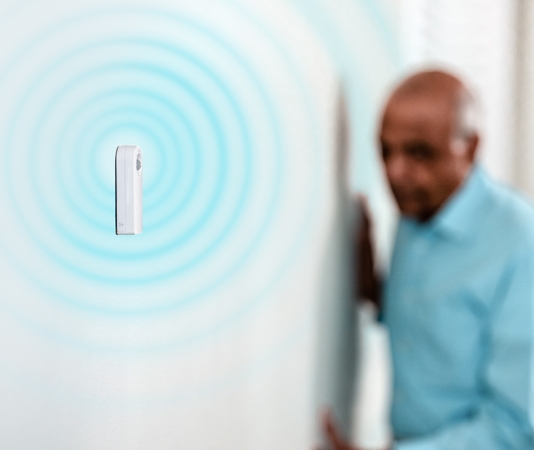With the changes in weather and shorter days during the fall and winter months, people living with Alzheimer’s disease can experience behavior and mood changes. One of these changes is called “sundowning.” According to the Alzheimer’s Association, studies have shown up to 20 percent of older individuals with Alzheimer’s disease experience sundown syndrome or “sundowning,” which is a change in behavior that happens in the late afternoon.
What Is Sundown Syndrome?
Sundowners syndrome is associated with Alzheimer’s disease as well as other forms of dementia, with up to 25% of Alzheimer’s patients developing sundowner’s. It causes behavioral changes such as increased agitation and confusion, which regularly occur in the late afternoon and early evening.
While sundowner’s syndrome in the elderly is most often associated with Alzheimer’s, there can also be rare instances of sundowning syndrome without dementia. The most common cause of this is when elderly patients without dementia spend a long time in the hospital. They can get disoriented and confused by the constant, unchanging surroundings, and that can wreak havoc with their internal clock. Medications and certain psychological conditions can also increase the chance of developing sundowner’s.
Causes and Symptoms of Sundowning
Seniors with memory loss conditions are more prone to experience sundowning symptoms that start around the early evening and continue into the late evening. One of the common causes of sundowner’s syndrome is when there is an interruption in Circadian rhythms—the cycles that tell the body when to eat, sleep, and wake up. This interruption can cause moods and behaviors to shift significantly. Direct links have not been discovered yet; however, there are some possible causes of sundowning you may have noticed with a senior in your care.
What Triggers Sundowning?
Factors that may influence elderly sundowning syndrome can include:
- Overtiredness at the end of the day
- Biological clock mix-up between day and night
- Being in an unfamiliar place (such as a hospital or hotel)
- Interacting with unfamiliar people
- Deviating from routines and schedules
- Visual misinterpretation due to reduced light and increased shadows
- Caregivers’ possible nonverbal cues of frustration
- Inability to separate dreams and reality, resulting in disorientation
- Physical discomfort
Symptoms of Sundowning
While this phenomenon’s causes may be relatively unknown, there are some signs you can watch for that may indicate sundowning is in effect. If you notice seniors with behavioral, emotional, and cognitive changes, including anxiety, sadness, confusion, and delusions, you may need to conduct further investigation to rule out or confirm sundowning.
How Can Caregivers Support Seniors with Sundown Syndrome?
For seniors diagnosed with sundowning, symptom length can vary because every person is unique in how it affects them. Some seniors experience sundowning for several hours around the same time every evening. Then again, sundowners in other seniors may be prompted by an unexpected change in routine. In this case, symptoms usually go away without intervention once the shift is corrected.
Curious about how to help sundowners? Regardless of the symptom or length of occurrence, there are several ways you can support a senior through sundowning and provide care that helps them continue thriving.
Reduce Clutter and Loud Noises in the Evening
Sundown syndrome in seniors can be further exacerbated by loud noises and disorganization. Effective sundowning management might include designating times for quiet activities starting in the afternoon in preparation for the evening—when symptoms usually occur.
Some quiet activities you can suggest to seniors in your care can include:
- Playing soothing ambient sounds or music
- Reading poetry or a light-hearted book
- Going for a relaxing walk
- Playing an easy-to-follow card game or board game
Along with engaging in quiet activities, creating an atmosphere of organization can greatly reduce sundowning symptoms. You can help seniors by reorganizing furniture in a way that reduces clutter and anxiousness.
Regulate Light Exposure
Exposure to light is believed to affect everyone’s internal clock in some way. For the seniors in your care, sundowning symptoms may come on during specific times of the year when sunlight depletes, or the sun rises earlier in the day. A simple sundowner’s treatment could include managing your home’s lighting. A smart lighting system can automatically and gradually increase or decrease light depending on the time of day. This can help ease seniors experiencing sundowning symptoms into light changes.
Introduce Ways to Distract and Redirect
Since seniors experiencing sundowning can become distracted, disoriented, or agitated, you should try to distract them with things they enjoy. It’s never a good idea to argue or reason with a senior living with Alzheimer’s and in the midst of sundowning symptoms. Better alternatives to maintain a sense of calm include:
- Offering them their favorite snacks or drinks
- Having a family member or friend call them
- Turning on a favorite TV show (try to avoid potentially upsetting programming such as the news.)
Maintain a Structured Routine
For seniors living with Alzheimer’s disease, developing a routine is essential to continued sundowning intervention. Just as important, sundowning symptoms can significantly decrease when a structured routine (for both day and night) is established. The benefits of creating a routine for seniors experiencing sundowning include a sense of stability during the day and familiarity with their surroundings.
Medical Treatment for Sundowner’s
There is some evidence that Alzheimer’s medications, antipsychotics, and even melatonin could reduce sundowner’s symptoms. Light therapy can also help. These sundowner’s treatments are all worth discussing with your loved one’s doctor to see if they might be effective for the person’s individual needs.
Get In-Home Elder and Dementia Care Support
If you’re caring for a loved one with dementia, you don’t have to do it alone. The professional, compassionate caregivers at Homewatch CareGivers® are standing by and ready to help whenever you need it. Whether your loved one needs 24-hour care or on-demand care to cover occasional gaps in their support team, get in touch with us today.
Call 888-404-5191 or contact us online to schedule a free in-home consultation.




.0000000000000.jpg)
.1803151925550.jpg)